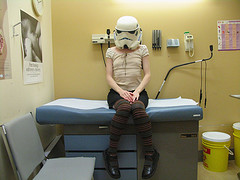How Will People Without Bank Accounts Pay For Health Insurance?
Next January, everyone in America will have to have health coverage or run afoul of federal health care law. But what about those 51 million adults who heavily rely on check-cashing stores and money lenders, and who may not have a checking or savings account? If you don’t have a relationship with a bank, it’s going to be tricky to pay for that required coverage.
NPR‘s All Things Considered takes a look at how the situation is likely to shake out come January for people who will have to buy health insurance with federal subsidies in the online insurance marketplaces. Many health plans take a credit card for the first month, and then a customer has to pay every month with either a check or through an electronic transfer from their bank account.
If you don’t have that, well, the future is unclear.
“You don’t want to take these millions of unbankable people through the entire enrollment process and then at the end of line say, ‘OK, the only way you can pay for your share of the premium is with a bank account number,’ ” notes Dan Schuyler, a director at Leavitt Partners, a firm that is advising private insurers and states on how to comply with the law.
Consumer advocates are aware of the coming problem for so-called unbankables, and say that if consumers are required to purchase health coverage, they’re going to need other options besides banks that are easy and affordable.
“I think there is a dawning awareness that this is a large problem,” Brian Haile, senior vice president for health policy at Jackson Hewitt Tax Service tells NPR. He formerly worked as the director of he Insurance Exchange Planning Initiative in Tennessee so he knows his stuff. “We raised these issues with the federal government well over a year ago and in a series of about four or five letters.”
Back then? Not a word.
The Affordable Care Act doesn’t require insurers to accept all forms of payment, and it’s not set out in any other federal health care law either. Perhaps, because federal officials don’t want to push insurance companies away from selling plans on the exchanges, and setting up such payment requirements might dissuade them.
For now, it’s kind of a wait and see game, as some providers like WellPoint told NPR they’re working on figuring out “expanded payment options to members.” Others like Cigna and UnitedHealthCare are asking states to allow them to set their own payment policies.
Latest Health Hurdle: Buying Insurance Without A Bank Account [NPR]
Want more consumer news? Visit our parent organization, Consumer Reports, for the latest on scams, recalls, and other consumer issues.


